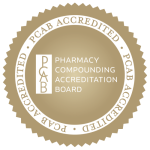Pharmaceutical compounding is the process of preparing customized medication to meet a patient’s unique medication treatment needs when there are no commercially available options. Each preparation is made under the supervision of a licensed pharmacist specialized in compounding and based on a licensed practitioner’s prescription. Contemporary pharmaceutical compounding combines art with science using sophisticated equipment and technology to provide creative treatment solutions backed by reliable scientific and medical data.
The practice of pharmaceutical compounding is becoming a popular solution to veterinary problems as it extends valuable benefits to today’s pet owners. Animals often have variations of the same diseases seen in humans. Medicating veterinary patients presents unique problems, that are often best solved with compounding.
Just like their owners, animals are unique individuals. They come in different shapes and sizes, species and breeds, with various conditions and sensitivities, intolerances and preferences. As a result, not all commercially available medicines are appropriate for every pet. That is where veterinary pharmaceutical compounding is especially helpful.
Top Considerations for Prescribing Compounded Medications
TThe first consideration to take into account when prescribing veterinary compounded medications is the legal guidance for manufacturing and distributing these drugs. Whereas with human compounding the medications are prepared primarily using bulk Active Pharmaceutical Ingredients (APIs) sourced from FDA-approved and GMP-regulated facilities, in veterinary compounding, the FDA guidance can be restrictive in allowing the use of these bulk API’s for customized vet medications. The American Veterinary Medical Association (AVMA) defines veterinary compounding as the altering of an approved animal or human drug, and this rule applies in most of the cases where a veterinary medication is compounded.
Veterinarians must be knowledgeable in and comply with the laws set by their State Board of Veterinary Medicine. Compounding Pharmacies must comply with the laws set by their State Board of Pharmacy and Federal regulations. Both the veterinarians and compounding pharmacists must be aware and in compliance with each other’s rules and regulations applicable to prescribing and preparing veterinary compounded medications. The same rules apply when the veterinary-pharmacist relationship crosses state borders. Each party must comply with the respective, state-specific rules and regulations, following the stricter interpretation.
Changing the dosage form/route of administration to better suit the vet patient’s need is another consideration for compounding. Sometimes an oral medication can be administered topically. For example, Methimazole, an oral hyperthyroid medication used commonly in cats, can be administered transdermally as an alternative to the standard route.
Many times, manufacturers discontinue drugs for economic or safety reasons in humans. If those drugs work well for the vet patient, the veterinarian may consider prescribing the specific medication that is only available through a compounding pharmacy. In similar scenarios, when a drug is back-ordered, the veterinarian will use a compounding pharmacy to get the medication for the vet patient.
Compounding Medications as a Solution to Unique Problems
A very common scenario in veterinary care is when pets are difficult to medicate because they refuse to swallow pills. Cats notoriously fall into this category, as they frequently refuse to swallow pills and usually eat right around medications disguised in food. This scenario can present a major problem when precise dosage adjustment is necessary.
For example, in dealing with dogs, a dose of medication that works for an 80-pound Golden Retriever would be far too large for a six-pound Yorkie to handle. In this case, adding a flavor during the compounding process, based on the pet’s preference, can make a dramatic difference in the patient’s compliance and lead to better clinical outcomes. The pet who refuses to take medication because of the taste is a prime candidate for a compounding solution. Whereas some cats don’t like pills, they may like tuna. Similarly, some dogs will reject a drug being squirted into their mouth in solution form, but the same dogs may gladly take the medication when it is flavored with meat or part of a tasty biscuit or treat.
Prescribing Compounded Medications for Veterinary Patients
The first and most important step in prescribing compounded medications for your veterinary patients is selecting a trusted compounding pharmacy that will best suit the specific veterinary practice’s needs. In our previous blog posts, we provided criteria for selecting a good veterinary compounding pharmacy. If the selection is made appropriately, the veterinarian should be confident that the compounding pharmacy takes into consideration not only the active ingredients but also the vehicles and bases used to prepare the medication.
An experienced compounding pharmacy has access to constantly improving, sophisticated, specialized and customized bases that can enhance the intended effect of the compounded medication while keeping patient safety at the forefront of the compounding process. In most cases, these new bases are accompanied by documentation showing their efficacy. This should be one major step or consideration in selecting the right compounding pharmacy and prescribing compounded medication for vet patients.
Open communication between the veterinarian and the compounding pharmacist is another critical aspect in providing the best possible customized care for the veterinary patient. Good communication between the compounding pharmacist and the caring veterinarian can provide open access to a myriad of compounded options for the animal patient in difficult-to-treat cases. The veterinarian can also rely on the pharmacist’s knowledge and experience to provide appropriate counseling for veterinary clients.
The selected compounding pharmacy will become the trusted, long-term partner for the veterinary practice. At this stage, prescribing compounded medications for veterinary patients will be a part of the routine activity of the veterinary practice.
Find Customized Care You Can Trust
Has your veterinary practice made the necessary considerations for prescribing compounded medications?
Vet practices that fully realize the value that pharmaceutical compounding can add significantly to their patients’ standard of care.
To find the customized care you can trust, take the appropriate steps to build a strong, successful relationship with a compounding pharmacy and utilize the many services they provide.
HALDEY Pharmaceutical Compounding is a trusted leader in veterinary compounding. Let HALDEY be your partner in providing customized care for your veterinary patients.
Contact us today for a free consultation.




